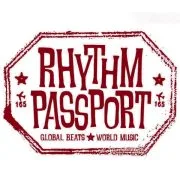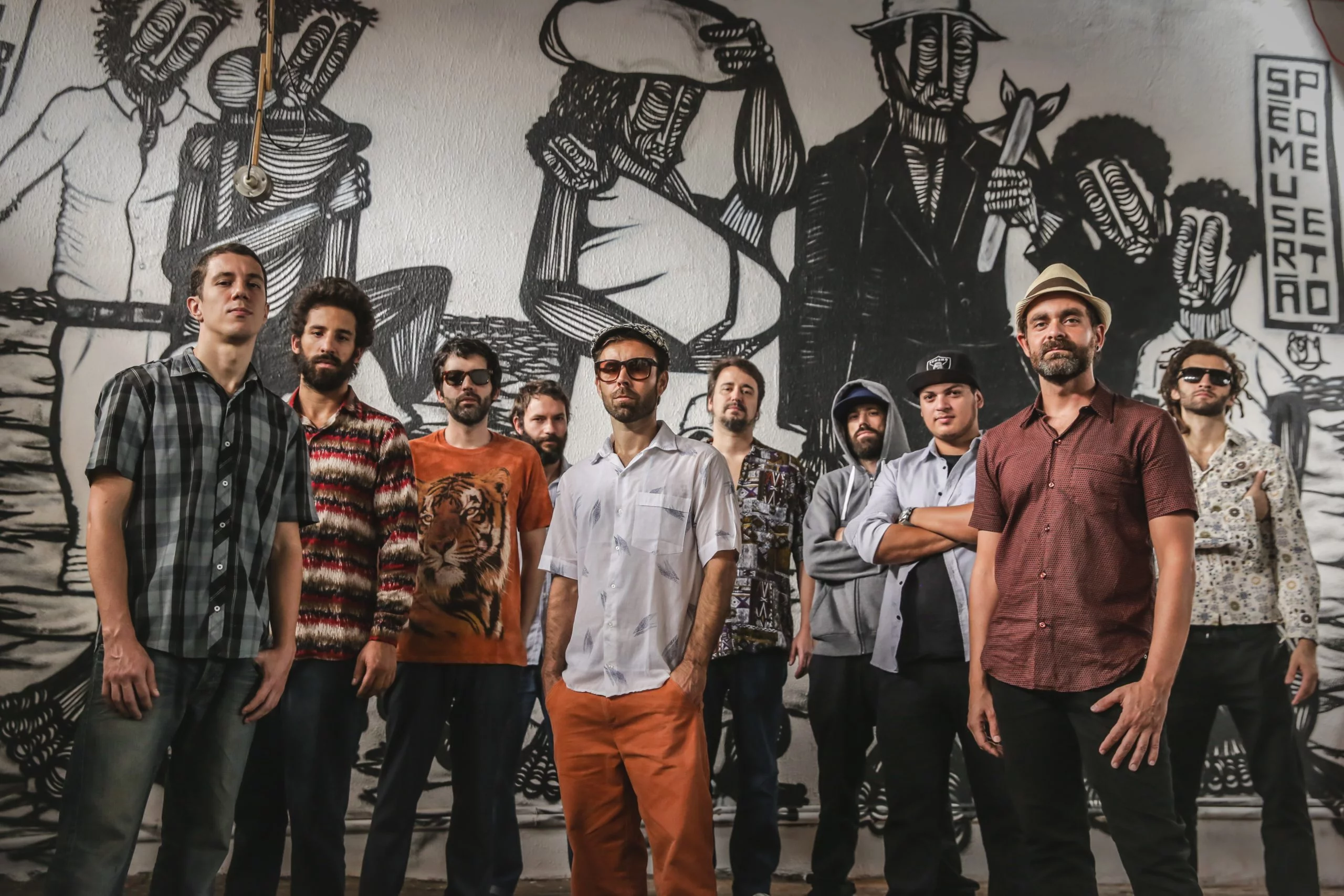Bixiga is a neighbourhood in the centre of São Paulo, but the name has come to mean far more than that. It is a way of life. It gathers together many faces of Brazilian identity having experienced waves of migration coming ashore in the city’s harbour for two centuries.
Today, the neighbourhood is the inexhaustible source of inspiration for dozens of artists, and amongst them Bixiga 70 are arguably the most emblematic characters. The ten-piece collective embodies the many souls, sounds and cultures that cohabit their native community, portraying in their musical blend elements with origins in Nigeria, Latin America, the Caribbean, Western Europe and Northern Brazil.
A few days after the release of Bixiga 70’s third album, simply called ‘III’, we had an engaging phone chat with Cuca Ferreira (baritone sax and flute player of the band) about the past, present and future of the collective. He discussed the lie of the land in Brazil and, the effervescent borough where everything started: São Paulo’s Bixiga.
“Bixiga is a crazy community because even if it is in the downtown area of São Paulo, it looks like a suburban borough. It is much calmer than the rest of the city, but at the same time you have a combination of all kind of people. When you walk around its streets you can find guys from Nigeria, others from Bolivia, and then you see Italian restaurants – cantinas and trattoria. I love to say that Bixiga is a symbol of what the city stands for”.
In the same way that Bixiga reflects the soul of São Paulo, Bixiga 70 embodies its musical character, and Cuca is really keen to highlight the relationship they have with their city.
“Actually, it took us a while to figure it out, but after playing together for some time we finally sensed that we have African influences, but also European and Northeastern Brazilian ones and Latin American ones too. So, it is possible to say that we are very connected to our city. In addition we have also realised that we are really connected to the history of our neighborhood too”.
So the neighbourhood is undoubtedly one of the first sources of inspiration for Bixiga 70’s music. Yet you could say that the creative impulse is something that goes beyond the borough’s borders and extends into the whole of São Paulo. In fact, when we spoke with Criolo after his recent WOMAD performance at Charlton Park we discovered that the Brazilian megalopolis is one of the best places to live if you’re a musician. So we asked Cuca to explain us why his city is so stimulating:
“Criolo is absolutely right. To understand São Paulo we have to look at the nature of the city itself. Being so crazy, with many people coming from different places it’s natural to see that there’s always something new emerging. Then I think that it is also because of the economic growth that Brazil has experienced in the last ten years, and which is now going down the drains. Until recently there were many non-governmental organisations that were really active in the social and cultural spheres. The main one is called S.E.S.C. Over the last twenty years this society has done a fantastic job in the city. It has built cultural centres, giving a performance platform, musical infrastructures and offering workshops to the people. In this way, these guys are playing a crucial role in the cultural life of São Paulo”.
One of the things we love to do with musicians coming from distant musical scenes is to ask them to recommend us some music from their most interesting and creative fellow citizens. Cuca was really keen to suggest some names to us who are promoting the new wave of São Paulo music.
“Criolo is probably one of the top guys, one who really made it into the mainstream, but besides him, there are many more. For example, Tulipa Ruiz is one of the singers we simply love- and played with. Then, there is Karina Buhr, who is one of the artists who came from Recife in the early 2000s and today is enrichingthe music scene of São Paulo. We also really like Metà Metà and all the projects they are involved in. In addition there are a lot of new songwriters. Amongst them is a band called Trupe Chá de Boldo – younger than us and doing really good work in terms of songwriting. And finally Emicida, who is another huge MC besides Criolo”.
However, if musically São Paulo and Brazil at large are still a reference for the whole world, socially and politically the situation is different and worsening day by day. Brazil has recently entered catch-22 situation with no light at the end of the tunnel, and Cuca’s words confirmed our presentiment.
“Brazilian and São Paulo music flourished until few years ago when the economy was booming, but today the situation is really different Actually, politics and the economy started to go really badly a couple of years ago and now they’re reaching rock bottom. I’m a bit pessimistic now because the country is going though a really dark period”.
Cuca linked the current situation to last year’s election.
“Last year we had the presidential election from which Brazil came out completely divided, shattered and broken into two sides. Today you’re on one side or the other. There is no room for discussion or a third way, and this is a big part of the problem”.
The elements causing this situation are many, and Cuca feels that they will deeply affect the whole of Brazilian society in the near future.
“There are many, many reasons that have caused this situation, and at some point we are going to pay the price of developing a country that hasn’t developed its educational policies. People have the erroneous impression in Brazil that you can be considered a citizen if you have funds that enable you to buy stuff, but not if you go to school and earn a degree. It’s a mistake we started making generations ago during the military dictatorship, and now we are paying the price”.
To lighten the conversation we changed the subject and went back to the group Bixiga 70 and their music, which was the reason we called Cuca. We asked him what was the starting point of their project and how it developed.
“I think that it’s not possible to point to a beginning. It has always been something that evolved naturally. Bixiga 70 is not a band that has one leader who composes and everybody follow his ideas. Bixiga 70 is a band formed by ten guys and everybody is actively involved in the project. With time we have become more intimate with each other and got used to playing together. I can finally say that the album we just released, our third one, is completely collective. We went to the studio, looked at each other and asked, ‘what are we going to play?’ Then we started to create the groove, melodies and compositions from scratch. At the same time, you have ten guys who have been around the music scene for quite a while, so everybody brings his own influences and history. That’s why you can find different stuff going on in our works. For example, our percussionist has a history in African-Brazilian condomble percussion, while our keyboard player is a DJ, music digger and researcher. Then the bass player comes from rock’n’roll and hippy music and uses all these kind of influences. In addition, some of the guys in the horn section come from jazz. So in the end it’s the personal history of each one that combines into something that can accommodate a lot of stuff”.
To be a little nitpicking, we doubted that a ten-member band with many musical roots and histories can always work harmoniously.
“The problems usually come from different personalities more than musicians’ music histories. Brazilian music has always been a mixture of different things because Brazil itself is a combination of three different groups: African, native Indians and Europeans. But in our case we don’t have any problem with that. When we have problems it is usually when somebody wants to put forward an idea and everybody says ‘yeah that’s great, but please keep it for your own recording’. I’m joking! We are really good friends with each other! Some of Bixiga’s members were friends even before starting the project. It’s now the fifth year of playing and travelling together, so if we hadn’t become friends the band would have already finished”.
And how have these five years changed their approach to music and the way they compose and play it?
“What has deeply changed is the collective participation. If we go back to our first album it worked in a more individual way. Someone brought the original ideas and we built arrangements around them. Then, the second album was more cooperative because we started to work as a collective of composers, even if we still divided composing between the collective and individuals. Our latest work is a shared artistic process. I think that was the natural development for our project. Since we finally knew each other musically and personally we also felt freer to experiment. When you get this kind of confidence you finally feel to be part of an environment where you know everybody and how they think Then you can be more confident and take more risks”.
As a consequence, Bixiga 70’s music has undoubtedly become more courageous and positive. At the same time it is still a powerful medium, and its instrumental nature remains the main feature.
“It’s crazy because on the one side, to play only instrumental music makes our work more universal. Without lyrics it’s easier to communicate with people on the other side of the world who have no idea about the Portuguese language. On the other hand, it is also more difficult to be clear. In the end we really believe that by putting together a celebration and bringing people together in peace and letting them dance represents a very political attitude. Then what we can’t communicate with our music we try to explain when we’re on stage by talking to our audience”.
Despite the fact that they are celebrated back home, Bixiga 70 are still an up-and-coming phenomenon in the U.K. So to end our interview we asked Cuca how he’d like to introduce his band to people who’ve never listened to their unique sound before.
“We realised very soon that the music we are producing makes sense to people all over the world. We had some great experiences in the U.S. and Europe during the last few years, and it has been wonderful to see how much music can touch people.
So my message is to feel free to dance and enjoy our sound. Get on the same boat that we have been travelling on since 2010!”


